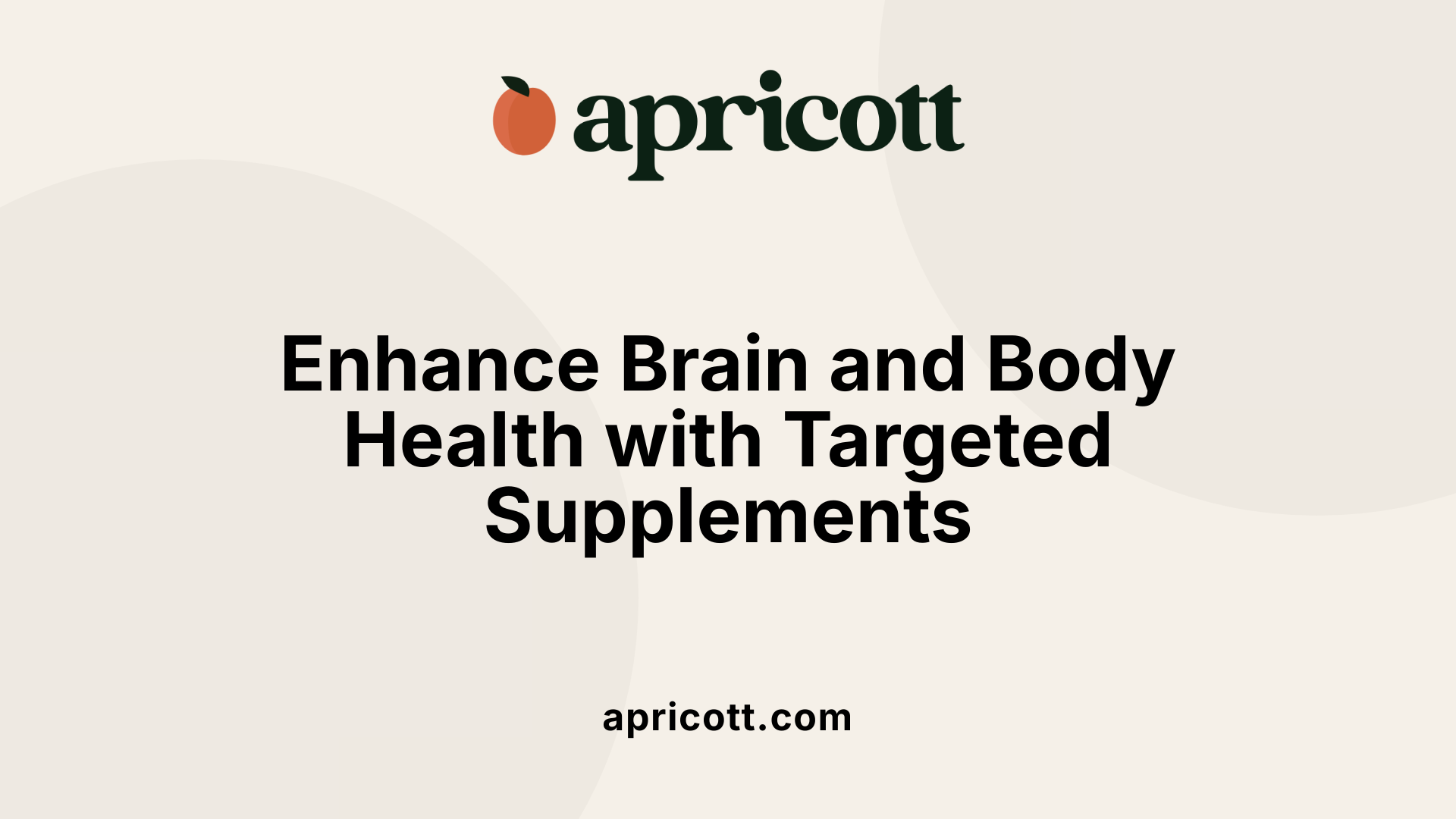September 4, 2025
Enhancing Autism Care Through Nutritional Support
Autism Spectrum Disorder (ASD) presents a unique set of challenges, often accompanied by nutritional deficiencies due to dietary restrictions, gastrointestinal issues, or sensory sensitivities. Recent scientific research and clinical practices increasingly recognize the supportive role that supplements and vitamins can play in managing ASD symptoms. This article explores the nature of these supplements, their scientific backing, and guidelines for safe and effective use, providing a comprehensive overview for caregivers and healthcare professionals.

Supplements and vitamins are increasingly used as supportive interventions for children with autism spectrum disorder (ASD). Their primary purpose is to address nutritional gaps that may contribute to or exacerbate ASD symptoms. Many children with ASD often experience nutritional deficiencies due to gastrointestinal issues, restricted food preferences, and sensory sensitivities.
Research and clinical observations suggest that targeted supplementation can help improve certain behaviors and biological markers. For example, nutrients like folinic acid and vitamin B12 are highly regarded and have been associated with improvements in neurological and behavioral functioning. Studies indicate that many children with ASD have low serum levels of vital vitamins and minerals, including B vitamins, vitamin D, vitamin A, iron, vitamin C, calcium, zinc, magnesium, and omega-3 fatty acids. Correcting these deficiencies can support brain health and overall well-being.
The use of nutritional supplements varies widely among practitioners and parents. Some commonly used supplements include vitamins C and B6, essential fatty acids such as omega-3s, magnesium, probiotics, melatonin for sleep, and methylated multivitamins. For example, Vitamin C is known for its antioxidant properties and immune support, while omega-3 fatty acids are essential for brain development and reducing inflammation.
Public health agencies like the CDC acknowledge that dietary changes, including vitamin and mineral supplementation, are considered biomedical interventions for autism. Surveys reveal that nearly half of physicians recommend supplements for children with ASD, emphasizing their role in comprehensive care.
Parents and clinicians often report positive outcomes from supplement use, although scientific evidence varies for each nutrient. In some studies, children taking folinic acid or vitamin B12 have exhibited notable improvements in seizure control, communication, social interaction, and reductions in repetitive behaviors.
For instance, a major randomized, double-blind study demonstrated that a comprehensive vitamin and mineral supplement, such as ANRC Essentials Plus, could significantly enhance nutritional status and improve ASD symptoms. Participants in this study reported improvements in cognitive abilities, language, sleep quality, hyperactivity, and eye contact, with most benefits appearing within three months.
Similarly, omega-3 fatty acids, especially EPA and DHA, are associated with mood regulation, attention, and decreased hyperactivity. Probiotics have been linked to gastrointestinal symptom relief and improved behavior, owing to their role in restoring gut microbiota balance.
While anecdotal reports and parent surveys suggest benefits, robust scientific trials are essential for establishing definitive efficacy. For many supplements, current research results are mixed or preliminary, indicating a need for further investigation.
The potential effectiveness of supplements is often connected to their influence on biological processes involved in neurodevelopment. For example, folate, B12, and other methylated vitamins participate in methylation pathways crucial for DNA synthesis, gene regulation, and neurotransmitter production.
Methylation abnormalities and oxidative stress are common in ASD, leading researchers to explore antioxidants and metabolic support. Supplements such as N-Acetylcysteine (NAC) and alpha-lipoic acid may help counteract oxidative damage.
Moreover, mitochondrial dysfunction, often observed in children with ASD, can impair energy production in brain cells. Nutrients such as Coenzyme Q10 (CoQ10) and L-carnitine support mitochondrial function, potentially influencing cognition and behavior.
Gut-brain axis health also plays a significant role. Imbalances in gut microbiota have been linked to neurobehavioral symptoms. Probiotics and prebiotics aim to restore gut bacteria, which may impact mood, attention, and social behaviors.
In summary, supplements and vitamins act on various biochemical pathways vital for brain development and function. Future research continues to elucidate these mechanisms, with the potential to refine targeted nutritional therapies for ASD.
Children with autism spectrum disorder (ASD) often have dietary gaps that can be addressed with various vitamins and supplements. Due to restrictive eating habits or gastrointestinal issues, many of these children are deficient in essential nutrients. Commonly used supplements include vitamin D, especially vitamin D3, which has been linked to improvements in social behaviors and eye contact. B vitamins, such as B6 and B12, are frequently supplemented — often methylated forms — to support neurotransmitter function and brain health.
Omega-3 fatty acids, prominently found in fish oil, are valued for their anti-inflammatory properties and their role in cognitive and brain development. Melatonin is widely used to help address sleep disturbances, a common issue among children with ASD.
Probiotics, such as Bacteroides fragilis, are prescribed to help restore gut bacteria balance, potentially alleviating gastrointestinal symptoms and possibly influencing behavioral and neurological symptoms. Magnesium plays a role in calming the nervous system, and minerals like zinc and calcium are also commonly included.
Multivitamins that contain all necessary fat-soluble vitamins (A, D, E, K) along with active B vitamins and vitamin C are popular as they help fill nutritional gaps. Some formulations, like ANRC Essentials Plus, are based on research and designed specifically for individuals with autism, aiming to improve overall nutritional status.
In addition, ingredients like folinic acid, NAC, choline, inositol, and CoQ10 are included in various specialized formulations to support brain health, reduce inflammation, and manage oxidative stress.
Vitamin D (preferably D3) is essential for immune function and brain health, and studies suggest that supplementation can improve behaviors related to social interaction and repetitive behaviors. B vitamins, especially B6 and B12, are associated with neurotransmitter production; for example, a combination of methylated B6 and magnesium has been shown to support sleep, behavior, and social skills.
Omega-3 fatty acids, including DHA and EPA, are critical for brain development and reduce neuroinflammation. They are used in doses higher than typical dietary levels to support cognitive function.
Melatonin helps regulate sleep cycles, and its use can significantly improve sleep duration and quality, which in turn positively impacts daytime behavior and overall well-being.
Products like the Autism Nutrition Research Center (ANRC) supplements and Simple Spectrum are formulated with a combination of vitamins, minerals, and other nutrients that are research-backed to address autism-specific nutritional needs.
Common ingredients include:
| Ingredient | Purpose | Notes |
|---|---|---|
| Choline | Brain development, neurotransmitter synthesis | Often included in brain-support formulas |
| Coenzyme Q10 (CoQ10) | Antioxidant, supports energy production | Aims to improve mitochondrial functions |
| Inositol | Nervous system health | Used for anxiety and obsession symptoms |
| MSM (methylsulfonylmethane) | Anti-inflammatory, joint health | Supports gut health and reduces inflammation |
| MTHF (Folinic acid) | Supports methylation, brain function | Effective especially for genetic mutations like MTHFR |
| Bioperine | Enhances nutrient absorption | Contains black pepper extract |
| HydroCurc | Anti-inflammatory, antioxidant | Derived from turmeric |
These ingredients are often combined in high-bioavailability formulations intended to support neurodevelopment, reduce inflammation, and promote overall health. Their selection is based on clinical research showing potential benefits for individuals with autism.
When choosing supplements for children with ASD, it is important to prioritize quality. Opt for third-party tested products free from artificial colors, flavors, allergens, and fillers. Consulting with healthcare professionals ensures supplements are tailored to individual needs and safe to use alongside other treatments.
Overall, while many vitamins and supplements are used to support children with autism, their effectiveness varies among individuals. Many products, like ANRC-Essentials Plus and Simple Spectrum, have demonstrated promising results in scientific studies and parent reports, but continuous research is necessary to establish firm clinical guidelines.
Research on the use of nutritional supplements for children with autism spectrum disorder (ASD) presents a complex picture. While some studies indicate potential benefits, the overall evidence remains mixed, and further investigation is necessary to establish clear conclusions.
Several nutrients have shown promise in improving specific ASD symptoms. For instance, vitamin A, vitamin D, omega-3 fatty acids, and folinic acid have demonstrated some capacity to enhance social skills, reduce hyperactivity, and improve communication. Notably, a recent study using a comprehensive multivitamin/mineral supplement called ANRC Essentials Plus reported substantial improvements in behavior, cognition, sleep, and social interaction based on parent reports. Participants experienced benefits within three months, with most effects maintaining over time. Importantly, this supplement was associated with few adverse effects, suggesting safety when used appropriately.
Other research has focused on genetic and biochemical factors. For example, supplementing with methylated forms of B vitamins, including B6 and B12, has been linked to behavioral improvements such as increased awareness, better focus, and enhanced social engagement. Additionally, folinic acid has been shown to improve neurological and behavioral symptoms, particularly in children who exhibit low folate levels or auto-antibodies against folate receptors. These findings support the idea that addressing nutrient deficiencies and metabolic disruptions could be beneficial.
Despite these positive signals, many studies reveal limitations. Variability in study design, sample size, and supplement formulations leads to inconsistent results. For example, some trials using high doses of vitamin B6 with magnesium produced mixed outcomes, with some children experiencing benefits while others saw no effect. The heterogeneity of ASD symptoms and individual responses complicate the interpretation of results.
Furthermore, significant nutrient imbalances are common among children with ASD. Many exhibit deficiencies in vital vitamins and minerals such as calcium, vitamin D, zinc, iron, and omega-3s, often due to restrictive diets high in processed foods. Conversely, some children may have excessive levels of other nutrients, which can pose health risks.
Current evidence underscores the importance of medical supervision during supplementation. Since some nutrients can interfere with each other’s absorption and metabolism, expert guidance ensures safe and effective use. For example, calcium and iron compete for absorption, and high doses of certain vitamins can lead to toxicity.
In summary, while promising research points to the potential for certain supplements to support behavioral and neurological symptoms in ASD, definitive evidence remains elusive. More large-scale, well-designed clinical trials are needed to validate these findings, establish optimal dosages, and understand long-term safety. Until such data are available, supplementation should be tailored individually and administered under the guidance of healthcare professionals.

Many children with autism spectrum disorder (ASD) struggle with nutritional deficits due to gastrointestinal issues or highly restricted diets. This often results in low levels of essential vitamins and minerals such as iron, B vitamins, vitamin D, vitamin C, calcium, magnesium, and omega-3 fatty acids. Such deficiencies can impair various biochemical pathways, notably those involved in methylation, sulfation, antioxidant defense, and inflammatory regulation. Restoring these nutrients through supplementation can positively influence metabolic processes, supporting overall health and potentially reducing ASD symptom severity.
Research shows that targeted supplements like folinic acid, methylated B vitamins, omega-3 fatty acids, and a comprehensive multivitamin/mineral can bring about meaningful biochemical improvements. For example, folinic acid and vitamin B12 have been reported to reverse some neurological symptoms and improve behavior in children with ASD. Omega-3 fatty acids, especially DHA and EPA, are crucial for brain development and function, and some studies link their intake with reductions in hyperactivity and repetitive behaviors.
Behaviorally, many parents and clinicians observe enhanced eye contact, social engagement, and communication skills when children supplement their diets appropriately. Supplements such as probiotics and digestive enzymes can also alleviate gut issues like constipation and bloating, which are common in ASD. When the gut is healthier, children often experience improvements in mood, attention span, and overall behavior.
Various nutraceuticals are perceived to have higher benefits compared to conventional medications, with surveys indicating that many individuals with ASD and their caregivers report moderate to significant improvements. Minimal adverse effects are often associated with these supplements when used correctly.
Supplements can address specific biochemical abnormalities observed in ASD. For instance, individuals often display mitochondrial dysfunction, oxidative stress, and disturbances in methylation pathways. Substances like CoQ10, methylated B vitamins, and N-Acetylcysteine act as antioxidants, supporting cellular health and reducing neuroinflammation.
Probiotics such as Bacteroides fragilis have been shown in animal studies to reverse many autism-related behaviors by restoring gut bacterial balance. Improved gut health can, in turn, lead to better absorption of nutrients and a reduction in neurobehavioral symptoms. Additionally, compounds like sulforaphane from broccoli sprouts have demonstrated promising results—improving social responsiveness and reducing aggression.
Clinically, many families report improvements in cognitive functions such as receptive language, thinking skills, and learning capacity following supplement use. Sleep disturbances, common in ASD, often respond well to melatonin supplementation, leading to better sleep patterns, which are crucial for behavioral regulation and cognitive development.
Other reported benefits include reductions in hyperactivity, tantrums, and meltdowns. Help with social behaviors like eye contact and responsiveness has been observed with vitamin B12 and multivitamin supplementation, which support neurotransmitter synthesis and nervous system function.
Furthermore, specific interventions like high-dose omega-3 fatty acids and folinic acid have shown improvements in mood, reduced aggression, and increased attention span, contributing to a better quality of life. These positive outcomes not only enhance daily functioning but also support broader behavioral therapies and learning strategies.
| Nutrients/Supplements | Main Benefits | Supporting Evidence | Common Uses |
|---|---|---|---|
| Folinic acid, B12 | Neurological, behavioral improvements | Clinical trials, surveys | Reducing irritability, improving mood |
| Omega-3 fatty acids | Brain health, inflammation reduction | Research on hyperactivity, repetitive behaviors | Supporting cognition and mood |
| Multivitamins | Nutritional balance, overall health | Multiple studies, user reports | Filling dietary gaps, general wellbeing |
| Probiotics | Gut health, mood, behavior | Animal studies, some human reports | Constipation, gut-brain axis support |
| Melatonin | Sleep regulation | Parent reports, clinical use | Sleep disturbances |
| Sulforaphane | Social responsiveness, aggression | Pilot studies | Behavior modulation |
Overall, when used judiciously under medical supervision, supplements can be a valuable part of a comprehensive approach to managing ASD. They offer a way to address underlying biochemical imbalances and nutritional gaps, leading to tangible improvements in behavior, cognition, and overall quality of life for many individuals with autism.

Children with autism spectrum disorder (ASD) often face unique nutritional challenges. Dietary considerations aim to ensure they receive sufficient nutrients critical for their growth, brain development, and behavioral health. Many children with ASD are at risk of nutrient deficiencies due to gastrointestinal issues, restrictive eating habits, or food selectivity. Common deficiencies include vitamin D, B vitamins such as B6 and B12, minerals like zinc, iron, magnesium, and essential fatty acids like omega-3s.
Supporting optimal nutrition involves tailored dietary strategies. For instance, some children benefit from special diets such as gluten-free, casein-free, or low-carbohydrate plans, which may help with gastrointestinal discomfort and behavioral symptoms, although these should be implemented under professional supervision. Addressing sensory sensitivities through feeding therapy can expand food acceptance, reduce mealtime stress, and improve nutritional intake.
Gastrointestinal health plays a crucial role in nutrition. Probiotics like Bacteroides fragilis have shown promise in restoring gut bacterial balance, potentially alleviating GI symptoms and improving behavior. Additional gut-focused approaches include prebiotics, herbal supplements such as oregano or olive leaf, and digestive enzymes to enhance digestion and nutrient absorption.
Routine and environment are also vital. Creating a predictable, stress-free mealtime setting, using neutral language, and involving children in food choices can foster positive eating habits. These measures help ensure nutrient intake aligns with individual needs, supporting overall health and spectrum-related behaviors.
Personalized dietary plans recognizing each child's preferences and sensitivities can significantly impact their health outcomes. Because children with ASD often exhibit selective eating patterns, customized nutritional interventions—including multivitamins and mineral supplements—are common. These supplements cover nutritional gaps, especially for nutrients like vitamin D3, omega-3 fatty acids, and methylated B vitamins, which have been associated with improvements in behavior and cognition.
Gut health is heavily intertwined with nutritional status. Many children with ASD suffer from gut issues such as constipation, bloating, and enzyme deficiencies. Restoring gut bacteria with probiotics helps improve digestion, absorption, and may influence mood and attention. Also, addressing food sensitivities through diet adjustments has shown potential in reducing gastrointestinal distress and behavioral symptoms.
This approach emphasizes a holistic view: supporting gut health, respecting sensory preferences, and ensuring nutritional completeness. Thus, diet and gut management become central to comprehensive autism support, promoting better behavior, mood stability, and overall development.
| Aspect | Focus | Impact | Examples |
|---|---|---|---|
| Nutritional Intake | Balanced nutrients | Supports brain function, mood, and growth | Vitamins D, B6, B12, Omega-3s, minerals |
| Gut Health | Digestive support | Reduces GI distress, improves nutrient absorption | Probiotics, prebiotics, digestive enzymes |
| Dietary Approach | Personalized diet plans | Addresses sensitivities, promotes food acceptance | Gluten-free, casein-free, low-carb diets |
| Eating Environment | Routine and presentation | Encourages proper intake and reduces stress | Neutral language, involving children in choices |
Adopting these strategies can help optimize nutrition and gut health, which are crucial for improving behavioral outcomes and overall well-being in children with autism.

Ensuring safe and effective supplement use in children with autism requires careful attention to guidelines established by healthcare professionals. Since children with ASD often have specific dietary needs due to restrictive eating habits, gastrointestinal issues, and nutritional deficiencies, supplementation can be a helpful strategy when properly managed.
A fundamental step is consulting with a healthcare provider before initiating any supplement regimen. This is especially important for high-dose supplements like folinic acid and vitamin B12 injections, which have demonstrated potential benefits in improving language, cognition, and attention. These treatments should only be used under medical supervision to monitor for possible side effects or interactions.
For general nutritional support, a daily multivitamin designed for children with autism is usually recommended. Such multivitamins should contain all essential fat-soluble vitamins (A, D, E, K), active forms of B vitamins (like methylated B6, B12, and folate), and vital minerals such as calcium, magnesium, zinc, and selenium. It's important to choose third-party tested products, such as those verified by USP, to ensure quality and purity.
Supplement dosages should be carefully tailored based on the child's age, weight, health status, and specific needs. For example, vitamin D3 doses are adjusted to increase blood levels without causing toxicity, while minerals like magnesium and zinc are given at levels that support physiological functions without exceeding recommended daily limits.
In addition, supplements like omega-3 fatty acids are considered beneficial for brain health, but doses must be appropriate; adult doses often exceed dietary recommendations and should be guided by a healthcare professional.
Monitoring is crucial throughout supplementation. Regular blood tests may be necessary to evaluate nutrient levels, assess for toxicity, and track overall health status. This ongoing oversight helps prevent adverse effects that could stem from excessive intake or interactions between multiple supplements.
Safety precautions include avoiding artificial additives, preservatives, and common allergens in supplement products, and ensuring that supplements do not interfere with any existing medications.
In summary, safe supplement use in autism hinges on professional guidance, personalized dosing, ongoing monitoring, and choosing high-quality products. This approach maximizes potential benefits while minimizing risks, contributing to a balanced nutritional strategy tailored to each child's unique needs.

Many parents and practitioners turn to nutritional supplements, or nutraceuticals, aiming to enhance the well-being of children with autism spectrum disorder (ASD). The scientific community has investigated various supplements such as vitamins, minerals, fatty acids, and other bioactive compounds to determine their benefits.
One of the most studied and consistently effective nutraceuticals is melatonin. It has shown promising results in improving sleep disturbances, which are common among children with ASD, and in turn, it can positively influence daytime behavior.
Vitamin D deficiency is more prevalent in children on the autism spectrum. Supplementing vitamin D, especially D3, has been associated with improvements in social interactions, eye contact, and reduction in repetitive behaviors.
Emerging evidence points to other nutraceuticals like resveratrol, palmitoylethanolamide (PEA), coenzyme Q10 (CoQ10), and anthocyanins for their antioxidative, anti-inflammatory, and neuroprotective effects. While these show potential due to their biological properties, clinical evidence remains limited or mixed, requiring further research.
A notable study evaluated a comprehensive multinutrient supplement called ANRC-Essentials Plus (ANRC-EP). Parents reported substantial improvements in various autism symptoms such as cognition, language, sleep, hyperactivity, and social behaviors. These benefits appeared quickly, within three months, and persisted over time. Importantly, most reported adverse effects were mild, and the supplement's benefits were consistent across different ages, severities, and medication statuses.
In a large survey, participants rated nutraceuticals as more beneficial overall than psychiatric and seizure medications, with minimal side effects. The perceived improvements ranged from slight to moderate, supporting the idea that some supplements could serve as adjunct treatments.
While the evidence for many supplements is promising, caution is advised. Effectiveness varies among individuals, and supplements should complement conventional therapies under medical supervision.
Recent studies reinforce the potential of targeted nutritional interventions. For example, supplementation with methylated B vitamins like folinic acid and vitamin B12 has shown to improve neurological and behavioral symptoms. One mechanism is the correction of biochemical abnormalities such as methylation deficits common in ASD.
Gut health is another focal point. Probiotics, such as Bacteroides fragilis, have demonstrated in animal models to reverse ASD-like behaviors, and some clinicians report improvements in children with gastrointestinal issues. Additional support through prebiotics, enzymes, and herbal remedies aim to restore gut balance and improve nutrient absorption.
Recent trials also investigated sulforaphane, derived from broccoli sprouts, showing improvements in social responsiveness and reductions in aggression. These findings highlight the interconnectedness between gut health, inflammation, oxidative stress, and neurological function.
Looking forward, the future of supplements in autism research is promising but requires cautious optimism. Researchers are exploring personalized nutrition plans based on genetic, biochemical, and microbiome profiles to tailor interventions more effectively.
Advances in understanding metabolic pathways, such as methylation and oxidative stress, will likely lead to more targeted therapies. Larger, well-designed clinical trials are needed to confirm the efficacy and safety of promising compounds.
Another exciting avenue involves combining nutraceuticals with behavioral and developmental therapies for a holistic approach. The development of comprehensive, evidence-based supplement protocols could enhance quality of life and support symptom management.
Technological innovations, including biomarker-driven diagnostics, may help identify which children are most likely to benefit from specific supplements. Regulatory frameworks will also evolve to ensure safety and standardization of these products.
Overall, future research aims to clarify mechanisms, optimize dosing, and determine which subsets of individuals with autism are most likely to benefit from specific nutraceutical interventions.
As research advances, the role of supplements and vitamins in autism management continues to evolve, highlighting the importance of personalized approaches and scientific validation. While evidence supports some benefits, routine use should be guided by healthcare professionals to maximize safety and efficacy. Ongoing studies and innovations hold promise for developing more targeted, efficacious nutraceuticals, ultimately enhancing quality of life for individuals with autism and their families.